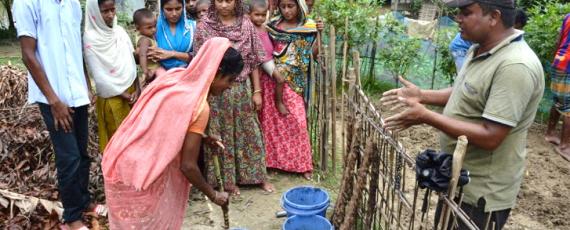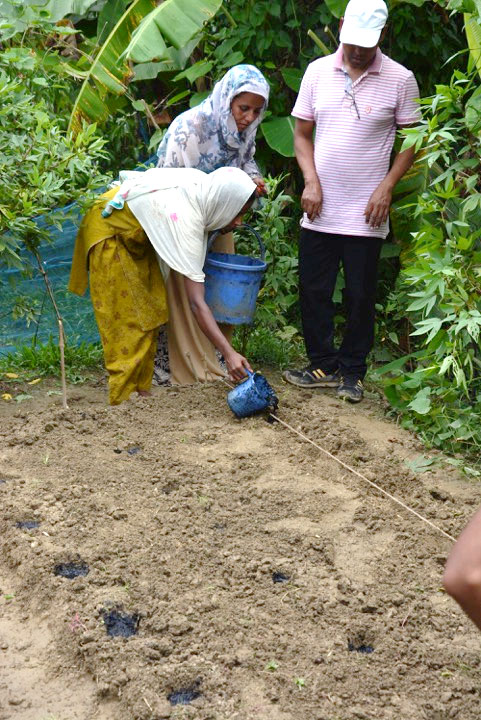Urine-biochar as fertilizer! Would Bangladeshi farmers accept it?

Biochar is created through burning biomass in an oxygen-limited environment. It is a light and porous material with high adsorptive and water-holding capacity. The Ithaka Institute in Switzerland invented a low-tech method to produce biochar that can be used at village level from crop and wood waste in soil-pit kilns.
Urine is known to be an excellent and highly efficient fertilizer and available for free unlike mineral fertilizer. However, it is underused because of the smell and associated socio-cultural barriers. Biochar can soak up urine and transform it into an odourless solid organic fertilizer that increases soil organic matter and promotes microbial soil life.
As part of the FAARM project in Bangladesh, small-scale farmers are growing crops in home gardens to improve family nutrition. Low soil fertility in the home gardens is a major problem and commercial mineral fertilizers are expensive. This encouraged the project team to search for innovative solutions for the farmers and they reached out to Ithaka Institute. The BUNCH project was thus started to test whether urine-biochar fertilizer could help our gardeners in Bangladesh. We wanted to be able to improve their soil fertility at a low cost, and also understand whether the technology would be socially acceptable to them.
Cow urine readily accepted, but stigma for human urine
We found that cow dung is widely used as fuel and fertilizer by both Hindu and Muslim communities in Bangladesh. Also, from a religious point of view, Hindus consider cow urine as holy. Therefore, both Hindu and Muslim communities in our study site in Habiganj readily accepted the concept of using biochar mixed with cow urine as fertilizer. They liked the cow urine-enriched biochar fertilizer because its ingredients are easily and freely available, is chemical-free and highly efficient as a fertilizer.

However, when we approached them with the idea of mixing human urine with biochar, both communities were very hesitant because of their religious and cultural beliefs. The villagers consider human urine as “impure” and “unholy”. They are also convinced that human urine is responsible for the spread of diseases, despite scientific literature not being in support of this.
In addition, some people were afraid of social isolation or thought that crops produced by using human urine were religiously forbidden (haram) to consume. Only a few individuals were willing to try human urine in agriculture as they thought it was possible to overcome the impurity-related barriers by taking a bath and changing clothes immediately after handling biochar-mixed human urine.
Getting acceptance from farmers
Using urine for crop production is a new concept in Bangladesh. Series of practical demonstrations were very helpful to train farmers in the manufacture and use of urine-enriched biochar fertilizer. Field trials are underway comparing yields to usual practice and to chemical fertilization. At a later stage it might become possible to convince farmers to tap into the rich supply of human urine to prepare biochar-based fertilizer. However, this would require wider promotion among farmer families as well as community leaders to become aware of the potential and safety of human urine.








Add new comment